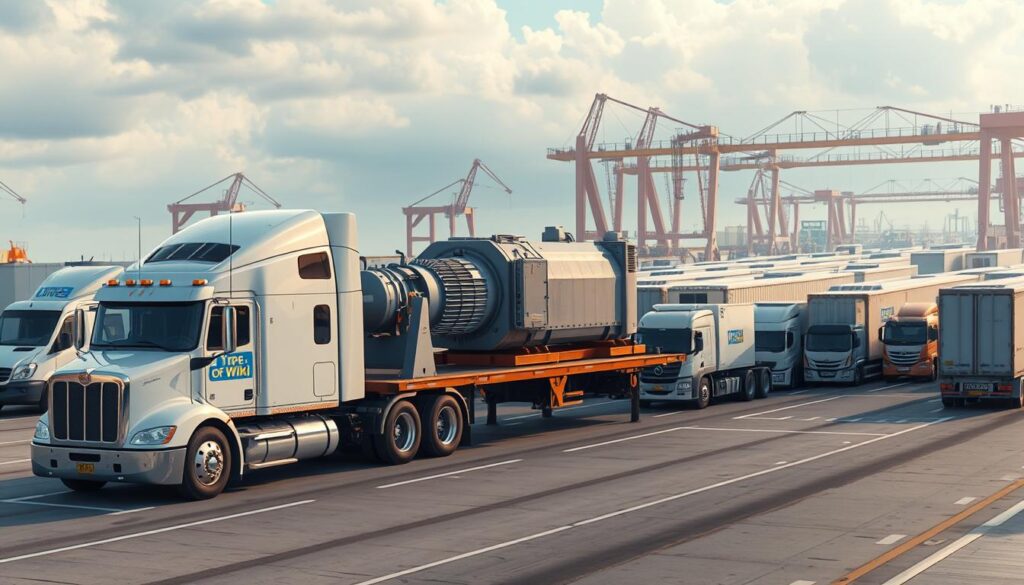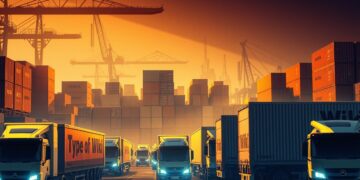The transportation industry is big and complex. Over 500,000 trucking companies work in the United States. As a business owner, finding the right freight solutions and transportation services can be hard.
Finding the right transportation company is key for a smooth supply chain. In this article, we’ll look at the 7 main transportation business types. We’ll also talk about their freight solutions. This will help you choose the best for your business.
Key Takeaways
- Understanding the different types of transportation companies and their services
- Identifying the right freight solutions for your business needs
- Exploring the benefits of various transportation business types
- Learning how to choose the best transportation company for your supply chain
- Gaining insights into the complexities of the transportation industry
Understanding Transportation Companies
Transportation companies are key in global trade. They make sure goods get to where they need to go. They help supply chains work smoothly by linking producers to consumers all over the world.
What is a Transportation Company?
A transportation company helps move goods or people from one place to another. They use trucks, trains, ships, and airplanes. This helps goods travel across different areas.
These companies come in different types. Some focus on moving freight, while others handle passenger services. Knowing these types helps businesses pick the best transport for their needs.
Importance in Supply Chain
Transportation companies are crucial for the supply chain. They make sure goods move efficiently. Without them, businesses can’t deliver on time, leading to losses and damage to their reputation.
Transportation companies play a big role in several ways:
| Aspect | Role of Transportation Companies | Impact on Supply Chain |
|---|---|---|
| Timeliness | Ensure goods are delivered on schedule | Maintains customer satisfaction and loyalty |
| Cost Efficiency | Optimize transportation costs through efficient routing and mode selection | Reduces overall supply chain costs |
| Flexibility | Offer various transportation options to adapt to changing demands | Enhances supply chain resilience |
By offering these essential services, transportation companies make supply chains more efficient and effective.
Freight Transportation Companies
Freight transportation companies are key in the global supply chain. They offer many services to fit different business needs. They make sure goods move well from one place to another, both near and far.
Types of Freight Carriers
There are many types of freight carriers for various business needs. These include:
- Less Than Truckload (LTL): Great for small shipments that don’t need a whole truck.
- Full Truckload (FTL): Best for big shipments that need a truck all to themselves.
- Air Freight: Fast for urgent or valuable items.
- Ocean Freight: Cheap for lots of goods going long distances.
Benefits of Using Freight Services
Using freight services can save money and be efficient. By picking the right carrier, businesses can get their goods on time and within budget.
Also, freight companies offer tracking and monitoring services. This lets businesses keep up with their shipments in real-time. It helps in planning and managing supply chains better.
Passenger Transportation Providers
As cities grow, the need for good passenger transport grows too. These services link communities and help people get to work.
Public Transit Systems
Public transit is key for city travel. It offers affordable and efficient ways for millions to move. Buses, trains, and subways are run by governments or private groups.
They make travel safe, cut down traffic, and lower pollution.
For safety info on public transit, check the FMCSA website. It shows how safe different transport services are.
Ride-Sharing Services
Ride-sharing has changed how we travel. It offers flexible and convenient ways to get around. Uber and Lyft lead the market with features like tracking and cashless payments.
More people choose ride-sharing over owning a car. It saves money and hassle.
As transport changes, public transit and ride-sharing will keep being important. They meet different needs and tastes.
Logistics Companies
Logistics companies are key to modern supply chains. They make sure goods get from one place to another well. They offer services that help businesses succeed in many fields.
These companies manage goods, info, and resources from start to finish. They help businesses run better, save money, and make customers happy.
Role in Supply Chain Management
Logistics companies are crucial in supply chain management. They handle warehousing, inventory, and transport. Their skills help businesses deal with complex global chains, ensuring products arrive on time and in good shape.
Working with a logistics provider helps businesses a lot. They get access to a big network and industry knowledge. For example, they can find the best transport routes, manage stock, and improve warehouse work.
Logistics companies help many industries, like manufacturing, retail, and healthcare. To learn more, visit this resource.
Key Features of Logistics Providers
Good logistics providers have important features. These include real-time tracking, fast delivery, and custom solutions. These help make supply chains better and more reliable.
These features give businesses a clear view of their supply chains. They can cut down on delivery times and boost their logistics. Logistics providers also help businesses adapt to changes or problems, keeping things running smoothly.
In short, logistics companies are vital for today’s businesses. They provide essential services that keep supply chains moving. By understanding their role and features, businesses can make better choices and improve their logistics.
Freight Forwarders
Freight forwarders are key in the logistics world. They help move goods across borders. Their skills in complex logistics are crucial for global trade.
Their Functions
Freight forwarders do many things for their clients. These include:
- Customs clearance: They make sure all rules are followed.
- Transportation arrangement: They arrange for goods to be moved by air, land, or sea.
- Documentation: They prepare and handle all needed documents for shipping.
- Insurance: They set up cargo insurance to protect against loss or damage.
Freight forwarders make logistics easier for businesses. This lets companies focus on what they do best.
Benefits to Businesses
Freight forwarders offer many benefits to businesses. These include:
- Expertise: They know a lot about shipping rules and logistics.
- Time-saving: Outsourcing to freight forwarders saves time and resources.
- Cost-effectiveness: They get better rates because they ship a lot.
The table below shows the main benefits of using freight forwarders:
| Service | Benefit |
|---|---|
| Customs Clearance | Follows rules, avoids delays |
| Transportation Arrangement | Moves goods well, offers flexible routes |
| Documentation | Makes sure documents are right and on time |
Using freight forwarders can make businesses more competitive globally. It also makes their supply chain more efficient.
Specialized Transportation Services
Specialized transportation services meet unique shipping needs. They are key for goods needing extra care or special conditions. This includes items that are too big or too sensitive for regular transport.
So, why are these services so vital? They handle a wide range of goods. This includes big machinery and medicines that need to stay at a certain temperature.
Heavy Haul Transport
Heavy haul transport moves very large or heavy items. It uses specialized equipment and planning for safe delivery. Goods like big machines and construction equipment are moved this way.
This service is about safe and efficient transport. It needs careful planning and skilled drivers. They use special trailers to handle the heavy loads.
Temperature-Controlled Shipping
Temperature-controlled shipping is for items that can’t handle temperature changes. This includes medicines, food, and chemicals. It keeps these goods at the right temperature during transport.
Advanced refrigeration technology and monitoring are used. These tools help keep the goods at the right temperature. This gives you confidence when shipping sensitive items.
Heavy haul and temperature-controlled shipping are crucial in logistics. They solve complex transport problems. By using these services, businesses can ensure their goods are delivered safely and on time.

Intermodal Transportation Solutions
Intermodal transportation combines different ways to move goods. It makes moving items across regions flexible and efficient. Businesses use truck, rail, and sea to create a smooth logistics flow.
Combining Different Transport Modes
Intermodal transportation uses many transport modes to get goods from start to finish. This way lets logistics providers tailor solutions for each business. For example, goods might go by truck to a rail station, then by rail to a port, and by sea to their final destination.
This flexibility helps businesses adjust to market changes or unexpected issues. Having many transport options means less risk of delays and cost changes.
Advantages of Intermodal Services
Intermodal solutions save money, cut down on travel time, and boost efficiency. They help businesses lower costs and speed up deliveries. Also, they help the environment by using more fuel-efficient ways like rail and sea.
Key benefits of intermodal transportation include:
- Cost savings through optimized transport mode usage
- Reduced transit times due to streamlined logistics operations
- Increased flexibility in response to changing market conditions
- Enhanced environmental sustainability through the use of fuel-efficient transport modes
As the logistics world changes, intermodal transportation will become more key. Knowing its benefits helps businesses stay ahead in a fast-changing market.
Last-Mile Delivery Companies
E-commerce is growing fast. This makes last-mile delivery companies very important. They connect the warehouse to your doorstep. Last-mile delivery is key to the supply chain, making sure goods get to you on time.
Understanding Last-Mile Logistics
Last-mile logistics means moving goods from a warehouse to your home or business. It’s the toughest and most costly part of delivery. It needs exact timing and can be hard to navigate in cities.
Key Players in Last-Mile Delivery
Some big names lead in last-mile delivery. UPS, FedEx, and DHL offer services for e-commerce and customers. They have what e-commerce needs.
A report says the last-mile delivery market will grow a lot. This is because of more online shopping and the need for quick, reliable delivery.
“The last mile is the most expensive and complex part of the delivery process, requiring innovative solutions to meet customer expectations!”
| Company | Delivery Speed | Tracking Capabilities |
|---|---|---|
| UPS | 1-3 business days | Advanced tracking |
| FedEx | 1-3 business days | Advanced tracking |
| DHL | 2-5 business days | Advanced tracking |
In conclusion, last-mile delivery companies are vital for e-commerce success. They provide the final link in delivery. By understanding last-mile logistics, businesses can handle its challenges and opportunities better.
Rail Transportation Services
Rail transportation is key to the global logistics network. It’s a cost-effective and green way to move goods. You’ll see why many businesses choose rail freight.
Benefits of Rail Freight
Rail freight has key advantages. It’s cheaper, better for the environment, and can carry lots of goods far. Companies save money and cut down on pollution.
Trains are good for the planet. They carry many containers at once. This cuts down on trips and emissions. It’s great for companies wanting to be green while keeping logistics smooth.
Major Rail Freight Operators
Big names like Union Pacific and BNSF Railway lead the rail freight world. They serve many areas with reliable services.
These leading transportation companies spend a lot on new tech and better routes. They help businesses get their goods where they need to go fast and well.
In short, rail services are cost-effective, green, and efficient. They’re vital in the logistics world. As we look for greener ways to move goods, rail freight will play a bigger role.
Air Transportation Companies
The air transportation industry is key in today’s logistics. It helps move goods fast around the world. Air transportation companies offer a quick and reliable way to send goods over long distances.
Air Cargo Services Overview
Air cargo services meet the needs of businesses needing fast and secure goods transport. Air cargo has many benefits. It cuts down transit times, boosts security, and is great for high-value or urgent items.
Air cargo services help many industries, like electronics, machinery, pharmaceuticals, and perishables. They use advanced tracking systems and real-time monitoring. This ensures shipments are handled well and arrive on time.
Leading Air Freight Companies
Several top air freight companies lead the global market. They offer services for different business needs. Companies like FedEx, UPS, and DHL are known for their reliability and innovative solutions.
These transportation industry leaders invest in technology and infrastructure. This keeps them competitive in a changing market. Choosing a reputable air freight company helps businesses get efficient and cost-effective transport.
Maritime Transportation Firms
Maritime transportation firms are key in global trade. They help move goods across oceans. These companies are vital for the global economy, helping transport goods on a large scale.
Shipping Lines and their Roles
Shipping lines are a big part of maritime firms. They run the ships that carry goods worldwide. They handle cargo and keep ships in good shape, making sure goods arrive safely and on time.
Top shipping lines are among the top maritime companies. They offer many services for different shipping needs.
Container Shipping Explained
Container shipping is a big part of international trade. It uses containers that can move easily between ships, trucks, and trains. This makes shipping faster, safer, and cheaper.
Container shipping is popular because it’s flexible and reliable. It helps businesses save time and money.
Key Features of Container Shipping:
- Standardized containers for easy transfer
- Reduced handling costs
- Increased security for goods in transit
- Flexibility in transportation modes
Maritime firms are crucial as global trade changes. They must adapt to new demands and technologies to succeed.
“The maritime industry is a cornerstone of global trade, and its continued growth is essential for the global economy.”
| Shipping Line | Container Capacity | Network Coverage |
|---|---|---|
| Maersk Line | 3.8 million TEU | Global |
| COSCO Shipping | 3.2 million TEU | Global |
| Evergreen Line | 1.2 million TEU | Global |
Emerging Trends in Transportation
The future of moving things and people is changing fast. New technologies and a focus on being green are leading the way. We’re seeing big changes in how goods and people travel around the world.
Technology Impact on Transport
New tech is changing the transport world. Things like blockchain, AI, and IoT are making things better. They help save money, work more efficiently, and make customers happier.
Key Technological Trends:
- Blockchain: Makes supply chains safer and more open.
- AI and Machine Learning: Helps find the best routes and predict when things need fixing.
- IoT: Lets us track and watch over vehicles and shipments in real time.
These techs are making old ways better and opening up new possibilities. They’re changing how we do things in ways we never thought possible.

Sustainability in Transportation
The transport world is going green because of climate worries. It’s moving towards cleaner fuels, smarter ways of moving things, and electric cars.
Sustainable Practices:
| Practice | Description | Benefit |
|---|---|---|
| Greener Fuels | Using biofuels, LNG, and other clean fuels. | Less carbon in the air. |
| Efficient Logistics | Smart routes and less empty trips. | Less fuel used and less pollution. |
| Electric and Hybrid Vehicles | More EVs and HEVs on the road. | Big cuts in emissions. |
By following these trends, transport companies can be kinder to the planet. They can also work better and stay ahead in the market.
Conclusion
Choosing the right transportation company is very important. It can greatly affect your business’s success. Knowing what you need is the first step to making a good choice.
Factors to Consider
Look at service quality, reliability, and cost when picking a company. There are many services like freight, passenger, and logistics. Think about what your business needs and compare companies based on their skills, reputation, and prices.
Knowing about different services and providers helps you make a better choice. Whether you need special services or a full logistics solution, picking a reliable partner is key. This ensures your logistics and supply chain run smoothly.



















